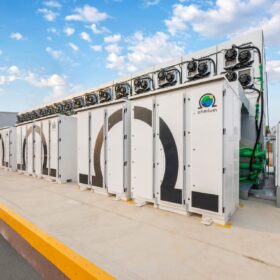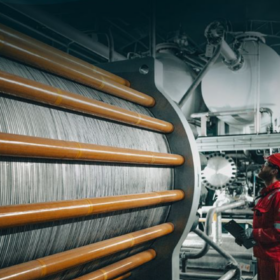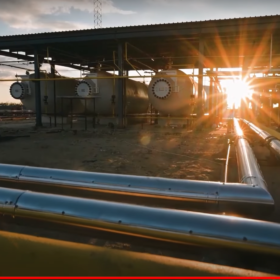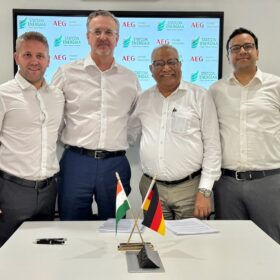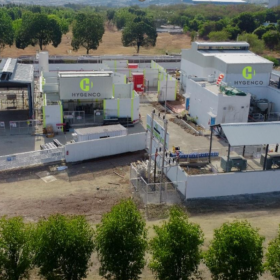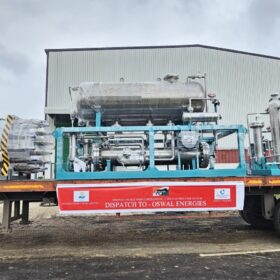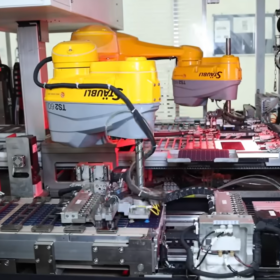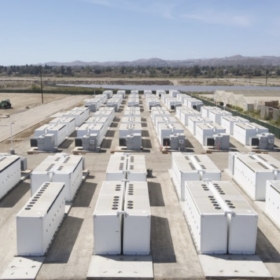Ohmium unveils new electrolyzer system with compact horizontal footprint of 29.7 m²/MW
Ohmium’s Lotus Mark 3 electrolyzer system with a compact land usage area of just 29.7 m2 per MW, including space for maintenance and access, sets new industry standard for land usage efficiency.
Greenzo Energy secures hydrogen electrolyser order from Engineers India Ltd’s R&D division
Greenzo Energy Ltd, an integrated green hydrogen company, has secured the order for modular hydrogen electrolyser unit from R&D division of Engineers India Ltd (EIL)—a public-sector enterprise under the Ministry of Petroleum & Natural Gas.
Thermax partners with Norway’s HydrogenPro on alkaline water electrolysis solution for large-scale hydrogen projects
Thermax has entered into an agreement with Norway-based HydrogenPro ASA (HydrogenPro) to supply, install, commission, and provide after-sales services for alkaline electrolyser systems based on HydrogenPro’s technology.
MNRE launches second call for proposals to build and upgrade green hydrogen testing infrastructure
India’s Ministry of New and Renewable Energy (MNRE) is seeking proposals from government organizations to create and upgrade testing infrastructure for various components, technologies, and processes used across the green hydrogen value chain. The selected projects will be funded up to 100% of the capital cost for equipment, installation, and commissioning of the equipment.
The Hydrogen Stream: India’s SECI awards 70,000 MT/year green ammonia at INR 53.05/kg
With this latest award, SECI has allocated a total green ammonia production capacity of 275,000 metric tonnes per annum across four reverse auctions, at prices ranging from INR 51.80 to INR 55.75 per kg.
Statcon Energiaa partners with Germany’s AEG Power Solutions for MW-class hydrogen rectifiers
Statcon Energiaa has secured a licensing agreement with Germany’s AEG Power Solutions (AEG PS) to design, manufacture, and service MW-class hydrogen rectifiers based on AEG’s advanced components.
Waaree Energies records INR 4,597.18 crore revenue in Q1 FY 2026
Waaree Energies Ltd has reached an order book of 25 GW—comprising 58.7% overseas and 41.3% domestic orders—valued at approximately INR 49,000 crore.
The Hydrogen Stream: Hygenco commissions green hydrogen plant to decarbonize Sterlite Technologies’ optic fibre production
Hygenco Green Energies has commissioned Maharashtra’s first green hydrogen and green oxygen production facility in Chhatrapati Sambhaji Nagar. This project will supply green hydrogen and oxygen to optic fibre manufacturer Sterlite Technologies Ltd.’s glass preform facility, supporting its goal to achieve Net Zero by 2030.
The Hydrogen Stream: IIT Madras, Hyundai to launch green hydrogen innovation centre
Hyundai Motor India Ltd (HMIL), in collaboration with IIT Madras, will establish a 65,000 sq. ft. green hydrogen innovation centre in Chennai, enabling research, development, and deployment of hydrogen technologies.
Oswal Energies receives first hydrogen electrolyser dispatch from Greenzo Energy for INR 320 crore green hydrogen project
Oswal Energies Ltd has received the first 1 MW electrolyser stack from Greenzo Energy India Ltd, marking the operational launch of its INR 320 crore green hydrogen project.
